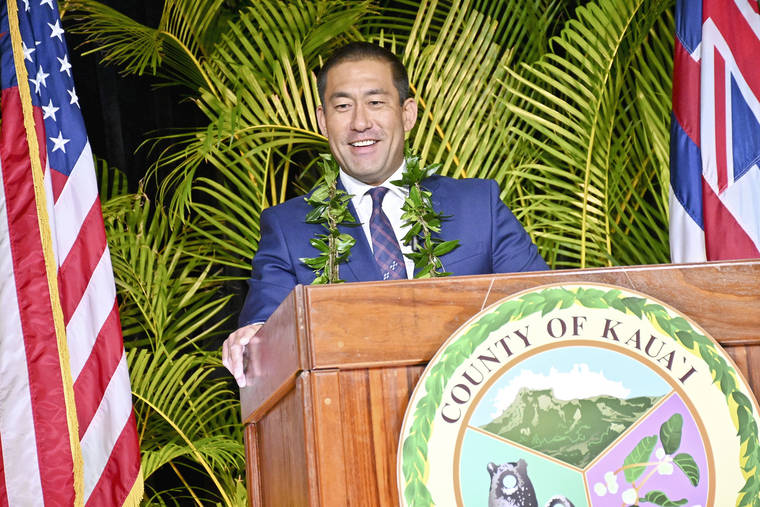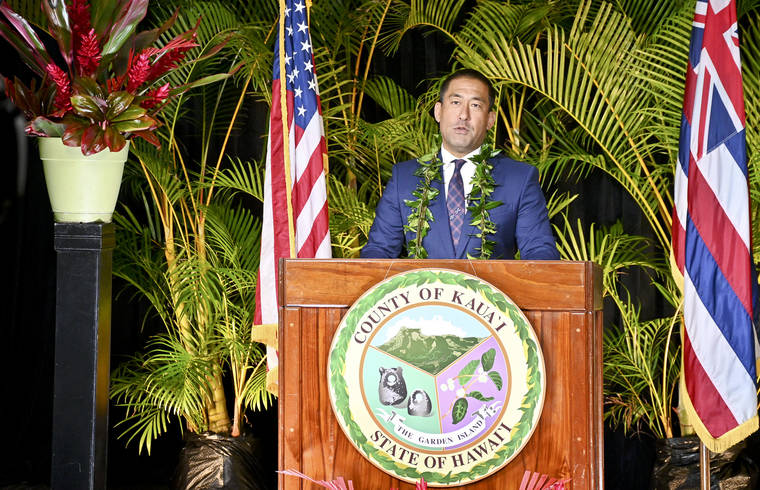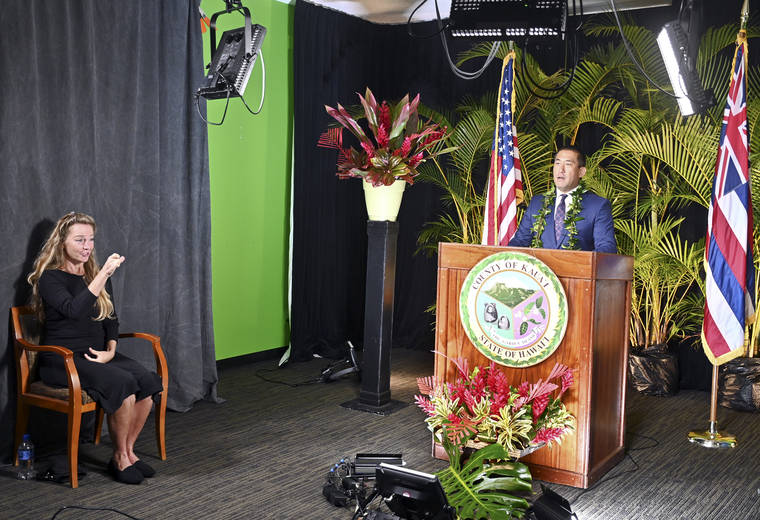LIHU‘E — Kaua‘i Mayor Derek Kawakami delivered his annual State of the County address virtually instead of in a regular public event on Friday, part of the preventative measures being taken to stop the spread of the COVID-19 virus.
In the address, Kawakami touched on proactive steps taken to stop the spread of COVID-19, upgrades to county services and information management, ongoing projects related to the April 2018 flood, and a proposed FY21 operating budget of $261 million, with a capital improvement projects budget of $36 million.
Dubbed “State of the County Twenty 2.0,” the State of the County address outlined a proposed real-property-tax increase, a switch in classification for vacation rental solid waste fees, and increased fees for parks and golf.
Kawakami also outlined budget priorities, including curbing vandalism at parks; increasing affordable housing; roadwork plans; a continued search for a landfill location; and additional proposed positions within the county government, including a sex assault coordinator in the Prosecutor’s Office.
It’s the first time a Kaua‘i mayor has given the address via video. The address was recorded Thursday and released on the county website and social-media pages around noon Friday.
At the beginning of the address, Kawakami said the action was taken to set an example for the community.
“For the past several weeks our state and nation’s leaders, including myself, have urged the public to practice enhanced health precautions by limiting opportunities to spread illness. As such, I felt it was necessary that we lead by example and take these precautions seriously,” Kawakami sid.
He also went over successes and strides taken by the county over the past year, and compared Kauai in 2020 with what life was like in 1920 — with a focus on how to “build a thriving Kaua‘i for the next 100 years.”
Kawakami introduced the proposed budget for fiscal year 2021, beginning on July 1 of this year, saying the “revenue outlook appears positive” for the fiscal year and citing collective bargaining costs and retirement liabilities that are putting pressure on the general fund.
He also pointed out the need to upgrade aging facilities and a large deferred-maintenance cost that “grows by the year.”
The county garners approximately $15 million annually in state transient accommodations tax revenue, but bills circulating within the current legislative session could change that figure, Kawakami said.
A proposed real-property-tax increase on about 300 ultra-high-value properties in the residential investor class is proposed that would increase revenue. That extra money is proposed to go to the Affordable Housing Trust Fund, which is dedicated to creating more housing on Kaua‘i.
Kawakami also proposed closing a loophole for solid-waste fees, reclassifying vacation rentals so they’re paying commercial rates instead of residential rates.
Also proposed is a wastewater-utility-rate increase that will lock in the county taxpayer subsidy at $1.5 million over the next five years. This rate change impacts less than 30% of households, as most homes are either on a private, commercial system, or use septic systems.
Other fee increases include one for county park users who aren’t Hawai‘i residents, as well as increasing county facility deposits and fines for those who don’t secure a permit, and an increase in fees at Wailua Golf Course, with the exception of the junior golf fee.
In conclusion, Kawakami went back to COVID-19 response, acknowledging the potential impacts to the island’s economy and the concerns of working families.
“Coronavirus is a stark reminder that our No. 1 economic driver, our visitor industry, is a volatile one. But we have and will be prepared for any and all effects of its wrath. Because our community is resilient. And we are stronger than any disaster that comes our way,” Kawakami said.
He continued: “Our county has been tested time and time again, and we always prevail. That has been the case for the past 100 years. And it will continue to be for the next 100 years. There is nothing that will break us.”
View the full State of the County Twenty 2.0 on The Garden Island Facebook page.
•••
Jessica Else, editor-in-chief, can be reached at 245-0457 or jelse@thegardenisland.com.





Every year he better put a county emergency on the Flu because if you read the facts then you’d know that the Corona Virus is no where near the threat as the Flu.
This virus is a blanket over something more serious.
You all just don’t know.